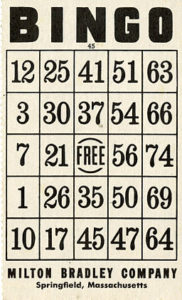
Think Outside the Buzzword
How to say a lot and nothing at all, all at the same time.
As far as professions go, management consulting has got to be the worst abuser of buzzwords. Sure, other professions have their own type of professional speak and acronyms. For example, my wife, who’s a nurse, talks about the COW on her floor C.O.W. is short for “computer on wheels”. I can understand that; after a while, you get tired of saying “computer on wheels”, “computer on wheels “, and “COW” is simpler and easier.
What I find just a tad irksome is when certain expressions are used, not because they simplify language, but because they do the opposite. In most cases, consulting jargon or buzzwords obscure and confuse matters. Some would argue that’s their primary purpose.
So without further ado, for those who may not be familiar with the gamut of consulting doublespeak, the following is a brief primer on consulting jargon and its true meaning.
Buzzword: “30,000 foot-level” (From a general and high-level perspective)
Example: “Today, we’d like to keep the conversation about our new market penetration strategy at the 30,000 foot-level.”
Real meaning: “Today, none of us is prepared to discuss our new strategy in an informed or knowledgeable manner. So let’s keep things pretty vague, okay?”
Buzzword: “Think outside the box” (To be innovative with solutions to a problem)
Example: “Given the market moves of the competition, we need to start thinking outside the box.”
Real meaning: “Given the market moves of our competition and that everything we’ve tried before hasn’t worked, perhaps it’s time to pray for a miracle.”
Buzzword: “To the next level” (To a distinctly better level of performance)
Example: “We need to find a solution that will take this company to the next level.”
Real meaning: “We know we need to start doing things differently or we’ll be toast. But don’t look at me: I’ve no clue what to do. Perhaps being this vague will buy us some time.”
Buzzword: “Strategic” (Simply add “strategic” to any noun, and voilà, it’s suddenly new and improved and ten times better than the old noun. So “marketing” becomes “strategic marketing”, “operations” becomes “strategic operations”, “selling” becomes “strategic selling”, etc.)
Example: “The problem with our marketing is that it’s not strategic enough. Our competition and the world have changed. We need strategic marketing.”
Real meaning: “We’re getting our butts kicked by the competition, and you guys in marketing are getting the blame whether it’s deserved or not. And we’re raising the bar higher for you to ensure we’ll have a scapegoat for the foreseeable future.”
Buzzword: “Parking lot” (A list of items in a meeting/offsite that appear off-topic, and are collected so they can be addressed at a later point)
Example: “Jim, that’s a really interesting point! Would you mind if we put that in the parking lot for now and come back to that later?”
Real meaning: “Jim, I have no idea how to answer that very relevant question. How about if I list it here, and hopefully we’ll forget about it later. If you don’t by the end of the meeting, I’ll review it, and then ask if I can get back to you later (hopefully by 2025).”
Buzzword: “Build on that” (Frequently used after someone else has made a comment that received interest from others)
Example: “Sally, great point! Mind if I build on that?”
Real meaning: “Sally, great point – I wish I’d said that. Can I jump in here and steal some of your thunder before you say other intelligent things that people appreciate even more?”
Buzzword: “In the weeds” (When one is getting too detailed for the taste of other group members)
Example: “Jack, that’s an interesting point, but I think you’re getting into the weeds.”
Real meaning: “Jack, you’re obviously much smarter, and know more about this issue than me. Stop it! Let’s go back to the 30,000 foot level.”
Sign up for The Advisory Alliance 60-Second Read
Categories
- board of directors
- career
- career development
- change
- coaching
- communication
- compensation
- conflict
- consulting
- critical thinking
- culture
- decision-making
- education
- experiential learning
- feedback
- high potential
- hr
- immigration
- influence
- innovation
- jobs
- knowledge economy
- leadership
- leadership development
- leadership style
- learning
- management
- management development
- motivation
- selection
- self-actualization
- skills shortage
- succession planning
- talent development
- talent management
- time management
- uncategorized

